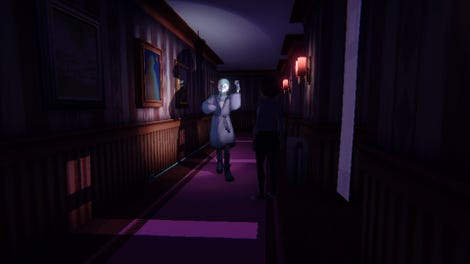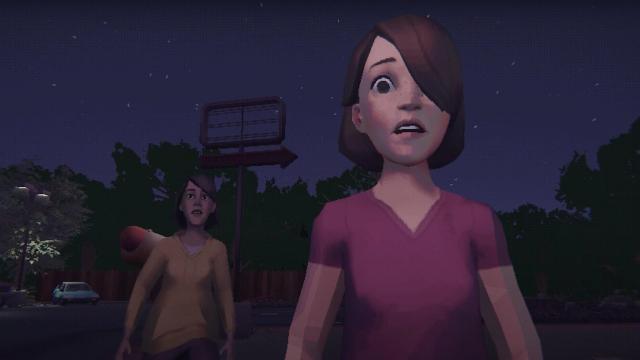Homebody is an unassuming horror game at first, set up similarly to recent socially anxious thrillers like Bodies Bodies Bodies (2022) and All My Friends Hate Me (2021): you’re late to meet up with old friends, they may or may not be mad, and there’s a killer, you think. But across the four hours I spend with Game Grumps’ approximately seven-hour-long game, it changes into an impressive and abstract, but nonetheless unsettling, dissection of obsessive-compulsive disorder.
Emily, the protagonist I guide through claustrophobic, fixed camera angles in-third person, is immobilized by her OCD. Her drive to the rental house her friends booked to watch the Perseids is prolonged by stinging what ifs—what if there’s terrible news waiting in her unread texts? What if she runs out of gas? “The cops are gonna find me a week from now,” she predicts, “a skeletal husk behind the wheel of my car.”
I know what that feels like, because I also have OCD. After 14 years, I’m used to intrusive thoughts polluting my brain like a noisy upstairs neighbor, triggering the disorder’s characteristic compulsions, or repetitive behaviors that seem like they’ll stop the panic, but actually only reward and reinforce a false sense of danger. In Emily’s case, intrusive thoughts about her car ride make her want to avoid it entirely, and she pulls over.
I’ve been there. I get it. But her friends, who’ve been awaiting her arrival for hours, don’t, necessarily. I chat with them as I explore the strange, imposing house—what if this electronic lock malfunctions? What if there’s no way out?—and hear more about their struggling art careers and fond college memories. Emily hasn’t spoken to any of them in a year, and so there are some awkward moments where they stumble over using the word “obsessive,” or avoid acknowledging the fact that Emily has become an agoraphobic shut-in. There’s no voice acting, only unfurling text strings, so when she’s prompted to share a story about what she pretends is an exciting, busy life, the best she can do is quietly mention she went out for breakfast last week.
Then shit gets “real,” however you want to define that.
Homebody is an unpredictable survival horror game
I’m exploring the kitchen, interacting with the objects highlighted by holding down L on my Switch. The house’s owner, Parker Nest, left behind a hefty binder with rules in it, though it doesn’t offer much in-game guidance, only quips about things like the “emotional fees” I’ll incur for exploring the prohibited attic. I click the burner on, but there’s no way to turn it off—I checked. It glows deep orange and sends a tea kettle screaming, and the power abruptly goes out.
Read More: My OCD Doesn’t Want Me To Play Horror Games, But I Do It Anyway
I keep walking around, now with a beam of light emanating from my chest, and tap on some of the game’s many puzzles with their wires I need to connect and keycodes I have yet to discover, the game’s mysteries locked away behind them. Important clues and locations become Polaroid snapshots in my memory log, which is accessible from the top left of the screen, automatically arranging themselves into a spiderweb of information.
The more I find, the closer my dread leans in. Though I only find the game’s D-tier animated movie art style perturbing in the sense that everything looks like it’s sculpted from gritty Play-Doh, Homebody does well to build discomfort in small environmental details and moments.
Guest book sign-offs and hoarded letters from the ‘70s spell out Nest’s hedonistic preoccupation with eternal life, which ultimately leads me to discover surreal areas of the house. For now, I notice a peep-hole sliced into a mounted painting, but there’s no apparent way into the room it points to. One part glitch (it seems) and one part design, Emily’s friends also appear to have spontaneously reset positions when the power went out, saying nothing when I promise to find a solution except, vacantly, “Okay.”
After the game’s camera also glitches a bit and causes me to flit in and out of the mouth of a hallway, I start to hear the killer snarling before I see it—a hunched plague doctor with a knife. Emily wheezes before she, like all of her friends, is stabbed and left bloody on the ground.
Acceptance is key
But that was supposed to happen. The game is set up like a somber Groundhog Day (1993), a survival horror less interested in actually surviving than it is in enduring, taking what you learned one night and using it to work out more puzzles as it repeats.
Virtually none of Emily’s friends know what’s going on, and all of the puzzles reset after death, so each night, I try to work with death-sentence efficiency and forge ahead in the game. I am, by nature, terrible at visual and math puzzles, both of which dominate Homebody, including one puzzle where you have to flip rotating wheels until they form a specific pattern, and another where you fill water pumps to a specific PSI. I found many of the puzzles difficult, but none unpleasantly so—except for, maybe, one that requires you to know how to play the 1989 logic game Minesweeper, at which I am truly, truly terrible.
I do what I can, then I let the bird man skewer me. After watching a hint screen or, more infrequently, a dreamlike cutscene that better establishes Emily’s history with OCD, I’m again standing up straight in the house foyer at 7 p.m.

Though I reveal what feel like significant plot points, I find them all to be highly impressionistic and up for interpretation. I never think Homebody is trying to stress one conclusion in particular, though it seems obvious that Emily’s repeated deaths while repeating puzzles in repeated hallways is an extended, carriage house-size metaphor for the obsessive thoughts congesting her life.
(I remember turning the oven off, but what if it malfunctioned? What if the carpet is already on fire? What if the people I love are dead? What if it’s my fault? I should double-check.)
Pop culture representations of OCD tend to be factually inaccurate and belittling, but while Homebody doesn’t go into specifics, the severity at which Emily experiences OCD feels so branded into the gameplay that it doesn’t have to—it’s still a welcome departure from form. There is a moment, for example, when I’m able to select “It killed us. It came from nowhere” as a dialogue option while talking to one of Emily’s blissfully unaware friends. When I choose it, though, Emily instead attributes her stress to hand wave-y “family stuff.”
I tend to avoid seriously talking to people about my OCD, too, especially in times where it’s been as physically and emotionally isolating as it is for Emily. Because of how personal it is, I don’t thirst for OCD representation in games, or in any media at all, really, but playing Homebody has been surprisingly cathartic. It’s an autopsy of the run-of-the-mill terror I’ve learned to live with and let go.

Leave a Reply